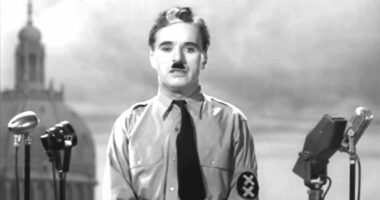Around the same time, though, Clooney was also saying yes to every project that came his way. And these ran the gamut from interesting like Three Kings (which behind-the-scenes was still a nightmare for Clooney after he got into a physical fisticuff with the film’s volatile and allegedly toxic director, David O. Russell) to… Batman & Robin.
So it might be fair to say Clooney didn’t fully establish himself as a full A-lister until The Perfect Storm in 2000, as pure a star vehicle as there could be in those early days of audiences still being wowed by CGI wonderment. Soon afterward Clooney basically defined what the Gen-X rat pack was alongside Brad Pitt, Matt Damon, Don Cheadle, Casey Affleck, and more in Ocean’s Eleven (2001). The image has stuck since Clooney is still partnering with Pitt on Apple TV+’s upcoming Wolves (hence the GQ interview).
So yes, Clooney’s ascendancy and perhaps peak as a box office draw was in the 2000s, albeit we’d point out it was true throughout the decade and not just “the millennium.” Yet what Tarantino appears to be carelessly ignoring is how adroitly Clooney was able to pivot something as fleeting and momentarily ephemeral as fame into a rich career that has kept Clooney not only at the top of the Hollywood hierarchy, but constantly engaged with interesting and challenging work.
For the record, Clooney again has the auteurs he collaborates with frequently, and we’d argue there have been few as entertainingly fruitful in this century as Clooney’s rapport with the Coen Brothers. Beginning in 2000’s pitch perfect riff on Deep South folklore and tall tales, O Brother, Where Art Thou?, Clooney and the Coens have so enjoyed developing what they christened their “trilogy of idiots” between O Brother, Intolerable Cruelty (2003), and Burn After Reading (2007) that they went ahead and added a fourth part to this triumvirate in the severely underrated Hail, Caesar! (2016).
Beyond that, Clooney used his immediate hard power and bankability in the 2000s to pursue the type of serious, adult-oriented dramas one imagines Tarantino might appreciate still getting made in Hollywood, even if he might have his own views on the specific films. Tony Gilroy’s Michael Clayton continues to grow in esteem as a newfound classic—unfortunately because its cynicism about late stage American capitalism has become a reality. Meanwhile The Descendants (2011) is one of Alexander Payne’s tenderest and funniest films which won Jim Rash and Nat Faxon screenplay Oscars; and of course alongside Sandra Bullock, Clooney lending his movie star status to Alfonso Cuarón helped get the risky and artful high-concept Gravity (2013) off the ground.
Clooney has also shown a lot more interest in his own directorial career over the last 20 or so years. Admittedly, we’d argue his only true great film behind the camera was curiously his second: 2005’s Good Night, and Good Luck. It certainly has aged better than the movie that beat it for Best Picture that year (Crash). But despite the rather disappointing results from his subsequent directorial efforts, including The Ides of March, The Monuments Men, The Midnight Sky, and The Boys in the Boat, the fact remains Clooney is using his clout and stardom to get adult-skewing dramas that otherwise would be ignored greenlit.









